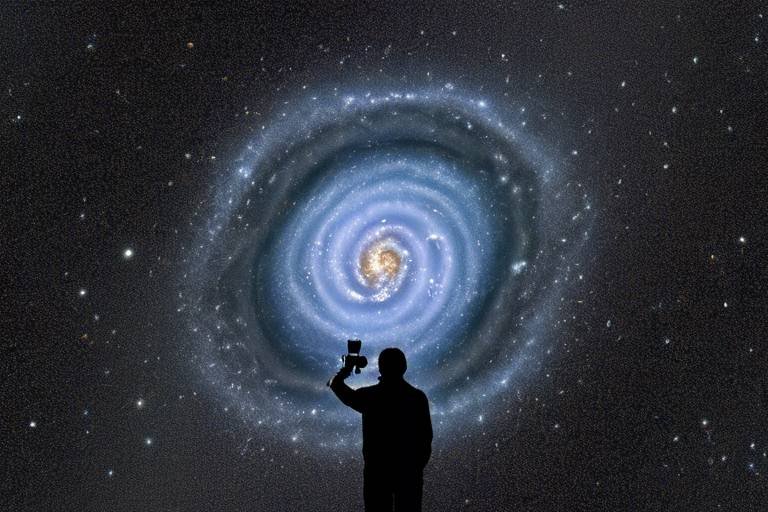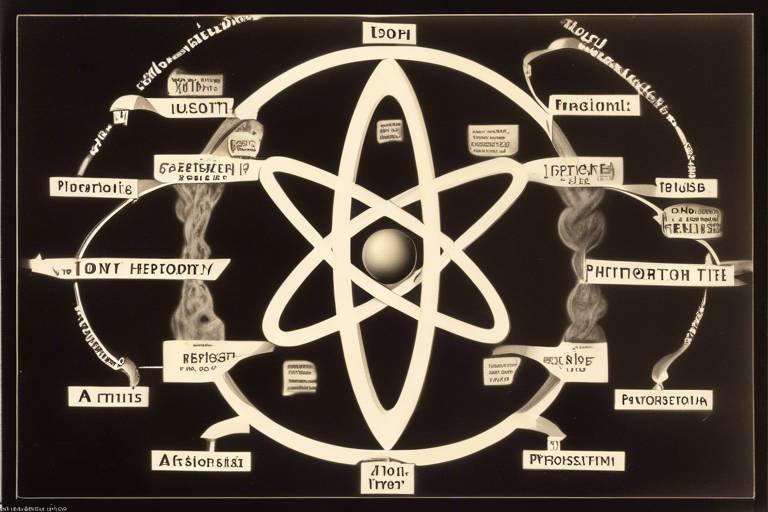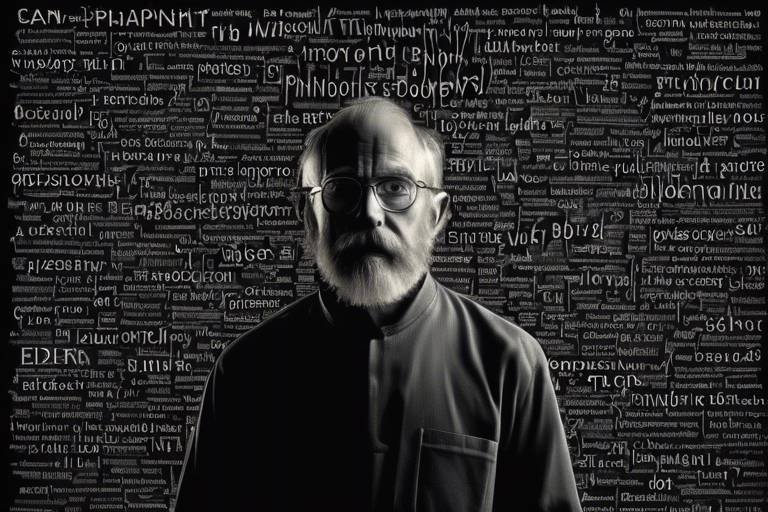The Philosophy of Astronomy - Unveiling the Cosmos
Have you ever gazed up at the night sky and felt a sense of wonder? The twinkling stars, distant galaxies, and the vastness of space can evoke feelings of awe and curiosity. But what if I told you that the cosmos isn't just a magnificent spectacle; it's also a profound philosophical playground? In this article, we will explore the intersection of philosophy and astronomy, examining how deep philosophical questions shape our understanding of the universe and our place within it. Buckle up, because we're about to embark on a journey that intertwines the mysteries of the cosmos with the intricacies of human thought!
When we talk about the universe, we often think of stars, planets, and the vast emptiness of space. But what constitutes reality? This question has puzzled philosophers for centuries. As we delve into the nature of cosmic reality, we encounter various philosophical perspectives that challenge our perceptions. For instance, is the universe merely a collection of objects, or is it a living entity with a purpose? Think about it: every astronomical discovery, from the discovery of exoplanets to the observation of black holes, forces us to reconsider our understanding of reality. Are we just observers in a cosmic play, or do we have a role to play in the grand scheme of things?
How do we know what we know about the universe? This question leads us to the field of epistemology, which deals with the nature and scope of knowledge. In astronomy, our understanding is shaped by scientific methods, theories, and, importantly, observation. The way we acquire knowledge about celestial phenomena is a philosophical exploration in itself. For example, consider how we interpret the data collected from telescopes. Each observation is not just a snapshot of the cosmos; it's a piece of a larger puzzle that requires us to engage with philosophical implications about what constitutes evidence and truth.
Observation is the bedrock of astronomy. It’s our primary means of gathering information about the universe. But what is the philosophical significance of observational evidence? When we gaze through a telescope, we are not merely looking at distant objects; we are participating in a dialogue with the universe. Each observation raises questions: How reliable is our perception? Are we truly seeing what we think we are seeing? This leads us to consider the limitations of our senses and the philosophical dilemmas that arise from them.
Human senses are remarkable, but they are also limited. Our eyes can only detect a fraction of the electromagnetic spectrum, which means that a vast portion of the universe remains unseen. This limitation poses a philosophical challenge: if we cannot perceive certain aspects of reality, does that mean they do not exist? The implications are profound. It suggests that our understanding of the cosmos is inherently incomplete. Just as a blind person can’t comprehend the beauty of a sunset, our limited perception constrains our grasp of the universe's true nature.
Thankfully, technology has come to our rescue! The invention of telescopes, satellites, and other instruments has expanded our ability to perceive the cosmos. However, this reliance on technology introduces another layer of philosophical inquiry. Are we still observers, or have we become mere users of sophisticated tools? How does our dependence on technology shape our understanding of the universe? These questions remind us that while technology enhances our observational capabilities, it also complicates our relationship with the cosmos.
Theoretical frameworks play a crucial role in guiding astronomical research. They help us make sense of the data we collect and provide models for understanding celestial phenomena. But how do various philosophical theories influence the development and interpretation of these models? For instance, the shift from a geocentric to a heliocentric model of the solar system was not just a scientific revolution; it was also a philosophical one. It challenged our place in the universe and forced us to rethink our conception of reality.
Now, let’s tackle some of the big questions: What is existence? What does it mean to be? In the realm of astronomy, these questions take on a cosmic dimension. The origins of the universe are a hotbed of philosophical debate. From the Big Bang theory to various cosmological arguments, scholars have grappled with understanding how everything came to be. It’s like trying to piece together a jigsaw puzzle with missing pieces; each theory offers a glimpse, but none provide a complete picture.
Cosmological arguments provide fascinating insights into existence. They delve into the reasons for the universe's existence and what that means for our understanding of reality. For example, the argument from contingency posits that everything that exists has an explanation for its existence, either in the necessity of its own nature or in an external cause. This leads us to contemplate the very nature of existence itself and our place in this grand cosmic narrative.
Infinity is a central theme in cosmology, and it brings with it a host of philosophical implications. The concept of an infinite universe challenges our understanding of time and space. If the universe is infinite, does that mean it has no beginning or end? How does this affect our perception of life and existence? It's akin to standing at the edge of an endless ocean; the vastness can be both exhilarating and daunting. As we contemplate infinity, we are reminded of our own limitations and the mysteries that still lie beyond our reach.
- What is the relationship between philosophy and astronomy?
Philosophy explores fundamental questions about existence, knowledge, and reality, while astronomy provides empirical data about the universe. Together, they help us understand our place in the cosmos. - How do technological advancements impact our understanding of the universe?
Technological innovations enhance our observational capabilities, allowing us to gather more data. However, they also raise philosophical questions about the nature of observation and our reliance on tools. - What are some key philosophical questions in astronomy?
Key questions include: What is the nature of reality? How do we acquire knowledge about the universe? What does it mean to exist in an infinite cosmos?

The Nature of Cosmic Reality
The universe is a vast, enigmatic tapestry woven from the threads of existence, and our understanding of it is often clouded by profound philosophical questions. What is the essence of reality? Is the cosmos a mere illusion, or does it hold a deeper significance? These inquiries have intrigued thinkers for centuries, prompting a rich dialogue between philosophy and astronomy. As we delve into the nature of cosmic reality, we find ourselves at the intersection of science and philosophy, where the boundaries of knowledge are tested and expanded.
At the heart of this exploration lies the question of what constitutes reality itself. Philosophers like Plato and Aristotle have long debated the nature of existence, with Plato famously positing the existence of a higher realm of forms, suggesting that our physical world is merely a shadow of a more perfect reality. In contrast, Aristotle grounded reality in the tangible world, emphasizing observation and experience. As astronomical discoveries have unfolded, such as the revelation of black holes and the expansion of the universe, our understanding of reality has been challenged to adapt. Are we merely observers in a cosmos governed by laws beyond our comprehension, or do we play a fundamental role in shaping our own reality?
Moreover, the advent of modern astronomy has introduced new perspectives on cosmic reality. As telescopes have evolved from the rudimentary designs of Galileo to the sophisticated instruments we use today, our ability to perceive the universe has dramatically changed. This shift raises philosophical questions about the nature of knowledge itself. Can we truly claim to understand the cosmos when our observations are mediated by technology? The philosophical implications are profound: if our perception is limited by our tools, how can we trust our understanding of the universe?
In grappling with these questions, we must also consider the role of theories in shaping our understanding of cosmic reality. Theoretical frameworks, such as the Big Bang theory and quantum mechanics, guide our exploration of the universe. However, these theories are not merely scientific constructs; they are deeply philosophical in nature. They challenge our intuitions and compel us to reconsider what we know about existence. For instance, the concept of a multiverse, where countless parallel universes exist, pushes the boundaries of our understanding of reality. It invites us to ponder whether our universe is just one of many, each with its own set of physical laws.
Ultimately, the nature of cosmic reality is a dynamic interplay of observation, theory, and philosophical inquiry. As we continue to probe the cosmos, we must remain open to the possibility that our understanding is ever-evolving. Just as the universe expands, so too must our ideas about reality. In this pursuit, we might find that the questions we ask are just as important as the answers we seek. So, are we merely stardust, or is there something more profound at play? The journey to uncover the nature of cosmic reality is one that invites us to explore not only the universe but also our place within it.
- What is the relationship between philosophy and astronomy?
Philosophy provides a framework for questioning the nature of reality, while astronomy offers empirical evidence that can challenge or support those philosophical inquiries. - How do technological advancements impact our understanding of the cosmos?
Technological innovations allow us to observe celestial phenomena that were previously invisible, expanding our knowledge but also raising questions about the limits of our perception. - What are some key philosophical questions in astronomy?
Some key questions include: What is the nature of existence? How do we define reality? What is our place in the universe?

When we think about the cosmos, we often marvel at its vastness and complexity. But have you ever stopped to consider how we actually come to know what we know about the universe? This is where epistemology—the study of knowledge—plays a crucial role in astronomy. It invites us to ponder the methods and processes through which we acquire information about celestial bodies and phenomena. Are we merely observers, or do we actively construct our understanding of the universe? The answers are as intricate as the cosmos itself.
At the heart of epistemology in astronomy lies the question: How do we know what we know? This question leads us down a rabbit hole of scientific methods, observational evidence, and theoretical frameworks. For example, astronomers rely heavily on data collected from telescopes and other instruments to formulate their theories. But what happens when these instruments reveal something that contradicts our established beliefs? Such moments challenge our understanding and often lead to significant shifts in scientific paradigms.
Observation is the cornerstone of astronomical inquiry. Without it, our knowledge of the universe would be limited to mere conjecture. The philosophical significance of observational evidence cannot be overstated; it serves as the bridge between theory and reality. When we observe celestial events—like the supernova explosion or the transit of a planet across a star—we gather data that can either confirm or challenge existing theories. This interplay between observation and theory is a dynamic process that continually refines our understanding of the cosmos.
However, it's essential to recognize the limits of human perception. Our senses are inherently flawed, and what we observe can be influenced by a myriad of factors. For instance, the light from distant stars takes millions of years to reach us, which means we are always looking into the past. This temporal disconnect raises philosophical dilemmas about the nature of reality. Are we witnessing the universe as it truly is, or merely a reflection of its history? Such questions challenge our understanding and force us to reconsider the very foundations of our knowledge.
In recent years, technological advancements have revolutionized our approach to astronomy. Instruments like the Hubble Space Telescope and the upcoming James Webb Space Telescope have expanded our observational capabilities, allowing us to peer deeper into the universe than ever before. Yet, this reliance on technology also brings philosophical implications. Are we becoming too dependent on our instruments to interpret the cosmos? As we delegate our observational responsibilities to machines, we must ask ourselves if we are losing the personal connection to the universe that once defined astronomy.
Theoretical frameworks guide our astronomical research and interpretation. They help us make sense of the data we collect and provide a structure for our understanding. However, these frameworks are not set in stone; they evolve as new discoveries are made. Philosophical theories such as realism and instrumentalism come into play here, shaping how we interpret the universe's mysteries. Realists argue that our theories aim to describe an objective reality, while instrumentalists contend that theories are merely tools for predicting observations. This ongoing debate highlights the fluid nature of knowledge in astronomy.
In conclusion, epistemology in astronomy is not just about collecting data; it's a rich tapestry of observation, perception, and theoretical interpretation. As we continue to explore the cosmos, we must remain aware of the philosophical questions that accompany our quest for knowledge. How we acquire, interpret, and understand this knowledge shapes not only our view of the universe but also our place within it.
- What is epistemology? Epistemology is the study of knowledge, focusing on how we acquire, validate, and interpret information.
- Why is observation important in astronomy? Observation is crucial because it provides the empirical data necessary to support or refute astronomical theories.
- How do technological advancements affect our understanding of the universe? Technological advancements enhance our observational capabilities, allowing us to gather more data and refine our theories, but they also raise questions about our reliance on instruments.
- What are the philosophical implications of our limits in perception? The limits of human perception challenge our understanding of reality and raise questions about the nature of knowledge and observation in astronomy.

Observation is the lifeblood of astronomy, acting as the bridge between our curious minds and the vast, enigmatic cosmos. When we gaze up at the night sky, we are not merely looking at twinkling stars; we are engaging in a profound act of discovery that has shaped our understanding of the universe. The philosophical significance of observation cannot be overstated, as it raises critical questions about the nature of knowledge and reality. How can we trust what we see, and what does it mean to truly observe?
From the ancient astronomers who charted the movements of celestial bodies with the naked eye to today’s sophisticated telescopes that peer billions of light-years into the depths of space, observation has evolved dramatically. Yet, despite this technological advancement, the fundamental philosophical questions remain. For instance, consider the concept of reality—what we observe might not represent the full picture. Our senses are limited, and our interpretations can be influenced by various factors, including cultural beliefs and scientific paradigms.
To illustrate this point, let’s take a closer look at the role of observational evidence in shaping our understanding of celestial phenomena. Observations can lead to revolutionary breakthroughs, such as the discovery of exoplanets or the detection of gravitational waves. However, these observations also require careful interpretation within a theoretical framework. The following table summarizes key observations in astronomy and their philosophical implications:
| Observation | Significance | Philosophical Implication |
|---|---|---|
| Galileo's Moons of Jupiter | Supported heliocentrism | Challenges geocentric views |
| Hubble's Redshift | Evidence of an expanding universe | Questions static universe theories |
| Cosmic Microwave Background Radiation | Supports Big Bang theory | Implications for the origin of the universe |
Moreover, the act of observation is not just about collecting data; it also involves a philosophical commitment to understanding what that data means. This leads us to consider the limitations of human perception. Our senses can deceive us, and what we observe might be a mere shadow of reality. This brings forth a fascinating dilemma: if our observations are inherently flawed, how can we claim to know anything about the universe?
As technology advances, we increasingly rely on instruments to extend our observational capabilities. Telescopes, satellites, and space probes have transformed our ability to explore the cosmos, allowing us to capture images and data that were once unimaginable. However, this reliance on technology raises another philosophical question: does our dependence on instruments diminish the authenticity of our observations? Are we still truly 'seeing' the universe, or are we merely interpreting data produced by machines?
In conclusion, the role of observation in astronomy is a complex interplay between empirical evidence and philosophical inquiry. It challenges us to reconsider our understanding of reality, knowledge, and existence itself. As we continue to explore the cosmos, we must remain vigilant about the implications of our observations and strive to grasp the profound mysteries that lie beyond our reach.
- Why is observation important in astronomy? Observation allows astronomers to collect data about celestial objects and phenomena, forming the basis for scientific theories and understanding of the universe.
- How has technology changed astronomical observations? Technological advancements have significantly enhanced our observational capabilities, allowing us to explore deeper into space and gather more accurate data.
- What are the limitations of human observation? Human senses are limited and can be deceptive; our interpretations can be influenced by biases and cultural perspectives.
- Can we trust what we observe in astronomy? While observational data is crucial, it must be interpreted within a theoretical framework and acknowledged that our perceptions may not capture the full reality.
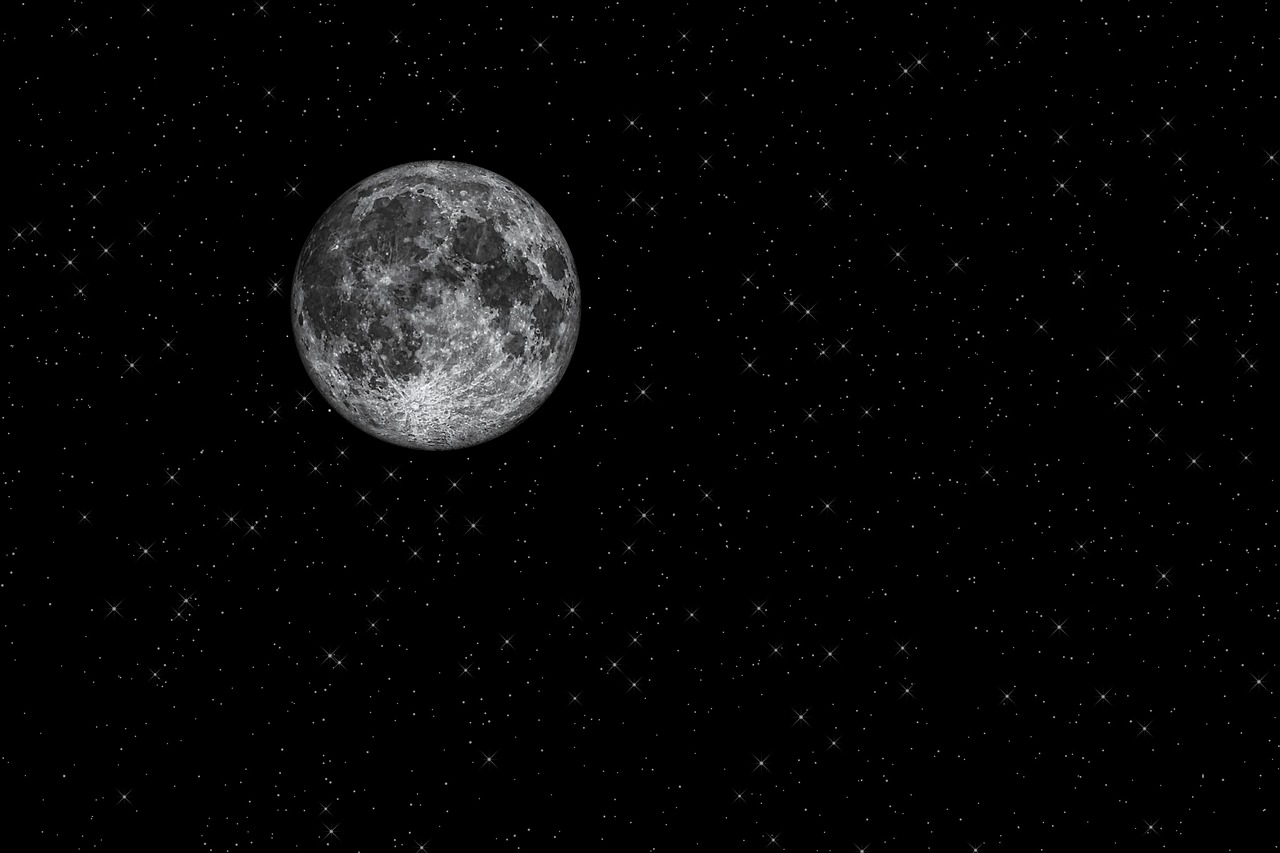
When we gaze up at the night sky, it's easy to feel a sense of wonder and awe. However, have you ever stopped to think about the limitations of what we can actually perceive? Our senses, while remarkable, are far from perfect. In the realm of astronomy, this limitation becomes particularly evident. The universe is vast and complex, and our human perception can only grasp a fraction of its true nature. For instance, visible light represents just a small portion of the electromagnetic spectrum, which means there are entire realms of the universe we cannot see without the aid of technology.
Consider this: if we were to rely solely on our eyes to understand the cosmos, we would miss out on critical information about celestial bodies that emit radiation beyond our visible spectrum, such as X-rays and radio waves. This limitation poses significant philosophical questions. Are we truly understanding the universe, or are we merely scratching the surface? Our perception is like a tiny window looking out into an infinite expanse. The more we explore, the more we realize just how limited our viewpoint is.
Furthermore, our senses can be deceiving. For example, when we observe a distant star, we are not seeing it as it is in that moment. Instead, we are witnessing light that has traveled for years, sometimes even centuries, to reach us. This delay creates a disconnect between reality and observation, leading to philosophical dilemmas about the nature of time and existence. Are we experiencing the universe as it truly is, or merely as it was?
Moreover, the human brain plays a crucial role in interpreting sensory information. Our brains are wired to recognize patterns and make sense of the world around us, but this can lead to misinterpretations. The phenomenon of pareidolia, where we see familiar shapes in random patterns (like seeing faces in clouds), illustrates how our perception can be influenced by our expectations and experiences. In astronomy, this means that our interpretations of celestial phenomena can be colored by our biases and preconceived notions.
To navigate these limitations, astronomers have developed sophisticated instruments and technologies that extend our perceptual capabilities. Telescopes, spectrometers, and other devices allow us to capture data beyond our natural senses. However, this reliance on technology raises another philosophical question: does the use of instruments enhance our understanding, or does it create a new layer of separation from the universe? In essence, while technology helps us perceive more, it also distances us from direct experience.
In summary, the limits of human perception in astronomy challenge us to reconsider what we know about the universe. Our senses, while incredible, are not infallible. The interplay between observation, interpretation, and technological enhancement creates a complex web of understanding that invites us to explore deeper philosophical questions. Are we merely observers in a cosmic theater, or do we have a more profound connection to the universe? The answers may be as vast as the cosmos itself.
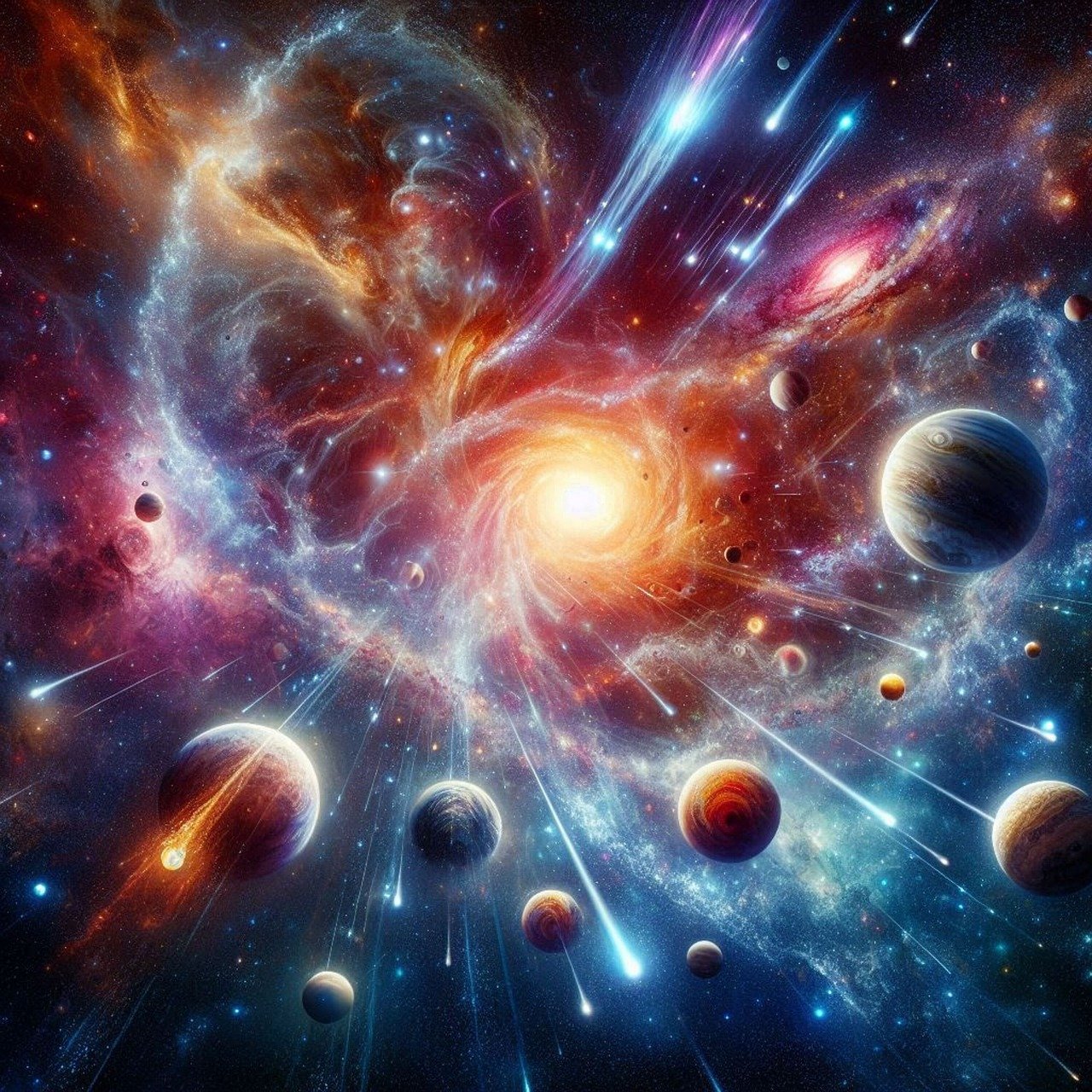
In the ever-evolving field of astronomy, technological advancements have played a pivotal role in shaping our understanding of the universe. Imagine standing in a dark field, gazing up at a sky filled with stars, and realizing that each of those twinkling lights represents a world of possibilities. With the advent of powerful telescopes and sophisticated instruments, we have transformed mere speculation into a realm of scientific inquiry. These innovations have not only enhanced our ability to observe celestial bodies but have also revolutionized the way we interpret data and formulate theories about our cosmos.
One of the most significant breakthroughs in astronomical technology has been the development of space-based telescopes, such as the Hubble Space Telescope. Unlike ground-based telescopes, which are hindered by atmospheric distortion, space telescopes provide a clearer, unobstructed view of the universe. This has led to remarkable discoveries, including the observation of distant galaxies, the identification of exoplanets, and a deeper understanding of cosmic phenomena like black holes and supernovae. Each image captured by these instruments is not just a snapshot of the universe but a window into its history, allowing us to piece together the cosmic puzzle over billions of years.
Moreover, advancements in computer technology have revolutionized data analysis in astronomy. Today, astronomers can process vast amounts of data collected from various observations, utilizing algorithms and machine learning to identify patterns and anomalies that would be impossible to detect by human eyes alone. This shift has led to a new era of big data astronomy, where the sheer volume of information can yield insights into the structure and evolution of the universe. For instance, the discovery of gravitational waves has opened up a new field of study, allowing us to observe cosmic events that were previously undetectable.
However, with these technological advancements come philosophical questions. Are we truly understanding the universe, or are we merely interpreting data through the lens of our instruments? As we rely more on technology, we must consider the implications of our observations. Are we losing the essence of direct human experience in our quest for knowledge? These questions challenge us to reflect on the relationship between technology and our understanding of existence itself.
Additionally, the use of artificial intelligence (AI) in astronomy is becoming increasingly prominent. AI can assist in classifying celestial objects, predicting cosmic events, and even simulating complex scenarios in the universe. While this technology holds immense potential, it also raises ethical considerations about the role of human intuition and creativity in scientific exploration. Are we at risk of becoming overly dependent on machines to interpret the cosmos, potentially sidelining the human element that has driven scientific inquiry for centuries?
In conclusion, the technological advancements in astronomy have undoubtedly expanded our horizons and deepened our understanding of the universe. Yet, as we embrace these innovations, we must also remain vigilant about the philosophical implications they carry. The cosmos is a vast and mysterious realm, and while technology provides us with powerful tools to explore it, it is our responsibility to ensure that we maintain a balance between scientific inquiry and the human spirit of curiosity that fuels our quest for knowledge.
- What are the most significant technological advancements in astronomy?
Some of the most significant advancements include space-based telescopes like Hubble, advancements in computer technology for data analysis, and the use of artificial intelligence in astronomical research.
- How do space telescopes differ from ground-based telescopes?
Space telescopes operate above the Earth's atmosphere, providing clearer images without atmospheric distortion, allowing for better observation of distant cosmic phenomena.
- What role does artificial intelligence play in modern astronomy?
AI assists in classifying celestial objects, predicting cosmic events, and simulating complex scenarios, thereby enhancing our understanding of the universe.

Theoretical frameworks are the backbone of astronomical research, acting as guiding principles that help scientists interpret data and develop models of the universe. These frameworks are not just dry, academic constructs; they are dynamic and often evolve as new discoveries are made. Think of them as the lenses through which we view the cosmos, shaping our understanding of celestial phenomena and anchoring our theories in philosophical thought.
One of the most significant theoretical frameworks in astronomy is the Big Bang Theory, which posits that the universe originated from an extremely hot and dense state approximately 13.8 billion years ago. This theory has profound implications not only for our understanding of cosmic history but also for existential questions about our place in the universe. It raises fundamental inquiries: What existed before the Big Bang? Is time itself a construct that began with the universe? These questions highlight how theoretical frameworks can challenge our perceptions and push the boundaries of human understanding.
Another critical framework is Relativity, proposed by Albert Einstein. This theory revolutionized our understanding of space and time, showing that they are intertwined in a four-dimensional continuum. It suggests that massive objects, like stars and planets, warp this fabric, influencing the motion of other celestial bodies. The philosophical implications are staggering: if time is relative, how do we define the past, present, and future? Are our experiences of time mere illusions shaped by our position in the universe? These are the kinds of questions that arise when we apply philosophical inquiry to astronomical theories.
Moreover, Quantum Mechanics introduces another layer of complexity. While primarily a framework for understanding the behavior of particles at the smallest scales, its principles have significant implications for cosmology. For instance, the concept of superposition—where particles can exist in multiple states simultaneously—challenges our classical understanding of reality. What does it mean for the universe if, at its most fundamental level, uncertainty reigns? This intersection of quantum mechanics and cosmology invites us to reconsider our definitions of existence and reality itself.
As we delve deeper into these theoretical frameworks, we also encounter the importance of philosophical theories that influence how we interpret astronomical data. For instance, the Anthropic Principle posits that the universe's physical laws are fine-tuned for the existence of life. This raises intriguing questions about purpose and design: Are we here by chance, or is there a deeper significance to our existence in this vast cosmos? Such philosophical explorations underscore how theoretical frameworks are not merely tools for scientific inquiry; they are also gateways to profound existential contemplation.
In summary, theoretical frameworks in astronomy serve as critical tools that guide our exploration of the universe. They shape our understanding of cosmic events, challenge our perceptions of reality, and invite us to engage with deep philosophical questions. As we continue to expand our knowledge through observation and technological advancements, these frameworks will undoubtedly evolve, leading to new insights and perhaps even more profound questions about our place in the cosmos.
- What is the Big Bang Theory?
The Big Bang Theory is the leading explanation for the origin of the universe, suggesting it began from a singularity approximately 13.8 billion years ago. - How does relativity change our understanding of space and time?
Relativity shows that space and time are interconnected, and massive objects can warp this fabric, affecting how we perceive motion and time. - What role does quantum mechanics play in astronomy?
Quantum mechanics introduces concepts like superposition and uncertainty, which challenge classical notions of reality and have implications for understanding cosmic phenomena. - What is the Anthropic Principle?
The Anthropic Principle suggests that the universe's laws are fine-tuned for the existence of life, prompting questions about purpose and design in the cosmos.

When we gaze up at the night sky, we are often struck by a sense of wonder and curiosity. The vastness of the universe prompts us to ask profound questions about existence itself. What does it mean to exist? Are we merely a fleeting moment in the grand tapestry of the cosmos, or do we hold a more significant place within it? These inquiries are not just the musings of philosophers; they lie at the heart of astronomical exploration and our quest for understanding.
Philosophers have long debated the nature of existence, often grappling with concepts that challenge our perceptions. One of the most intriguing philosophical debates centers around the origins of the universe. Some argue that the universe is eternal, existing without a beginning, while others posit that it had a definitive start, often illustrated by the Big Bang theory. This divergence in thought raises questions about causality and the nature of time itself. If the universe had a beginning, what came before it? And if it is eternal, what does that imply about our existence within it?
To delve deeper into these questions, we can look at a few key cosmological arguments that have shaped our understanding of existence:
- The Cosmological Argument: This argument posits that everything that exists must have a cause. Thus, the universe itself must have a cause, often attributed to a divine creator or a first cause.
- The Teleological Argument: This argument suggests that the complexity and order of the universe imply a designer. The intricate balance of forces that allow for life raises questions about the purpose behind existence.
- The Ontological Argument: This philosophical debate focuses on the nature of being and existence itself, questioning whether the very concept of a perfect being (or the universe) necessitates its existence.
These arguments not only shed light on our understanding of the universe but also invite us to reflect on our own existence. Are we mere observers of this cosmic dance, or do we play an integral role in it? The philosophical implications of our existence are profound, leading us to consider the nature of reality and our place within it.
Another captivating aspect of existence in relation to the universe is the concept of infinity. Infinity challenges our understanding of time and space, making us question whether the universe is boundless or if it has limits. The idea of an infinite universe suggests that there are endless possibilities and realities, which can be both exhilarating and daunting. How do we comprehend something that has no beginning or end? This contemplation of infinity not only stretches our imagination but also forces us to confront the limitations of human understanding.
As we explore these philosophical debates, we must consider how they relate to our everyday lives. The questions of existence and the universe are not just abstract ideas; they influence how we perceive our purpose and the meaning of life. In a universe that is constantly expanding and evolving, where do we fit in? Are we simply products of chance, or do we have a destiny shaped by the cosmos?
In conclusion, the intersection of existence and the universe is a rich tapestry of philosophical inquiry and astronomical discovery. It challenges us to seek answers to questions that have perplexed humanity for centuries. As we continue to explore the cosmos, we are reminded that our quest for knowledge is as much about understanding the universe as it is about understanding ourselves.
- What is the cosmological argument? The cosmological argument is a philosophical argument that asserts everything that exists must have a cause, implying that the universe itself must have a cause.
- How does infinity relate to the universe? Infinity in the universe raises questions about whether the cosmos is boundless or has limits, challenging our understanding of time and space.
- Why is the question of existence important? Understanding existence helps us reflect on our purpose and meaning in life, influencing how we perceive our place in the universe.

The cosmos has always been a source of wonder, prompting humanity to ponder profound questions about existence and the nature of reality. At the heart of these inquiries lie cosmological arguments, which seek to explain the existence of the universe and our place within it. These arguments are not just abstract concepts; they are the philosophical foundations that have shaped the way we think about existence itself. Imagine standing on a vast beach, gazing at the endless horizon where the sky meets the sea. This imagery resonates with cosmological arguments, which often start with the observable universe and lead us to deeper existential reflections.
One of the most famous cosmological arguments is the Kalam Cosmological Argument, which posits that everything that begins to exist must have a cause. This leads to the conclusion that since the universe began to exist, it must also have a cause. This argument invites us to consider the implications of causality not just in our daily lives but also in the grand scheme of the universe. If we accept this premise, we are compelled to explore what or who that cause might be. Could it be a divine entity, or is it something beyond our current understanding?
Another significant cosmological argument is the Contingency Argument. This argument suggests that everything in the universe is contingent, meaning it depends on something else for its existence. If everything is contingent, there must be a necessary being that exists independently of everything else. This necessary being, often identified as God, serves as the ultimate explanation for why anything exists at all. It’s like trying to trace the roots of a massive tree; if you dig deep enough, you’ll eventually find the seed from which it all sprang. This analogy helps illustrate the importance of seeking a foundational cause for existence.
Yet, cosmological arguments are not without their critics. Some argue that the universe could be eternal, thus negating the need for a cause. This perspective challenges the assumptions underlying many cosmological arguments and opens up a dialogue about the nature of time and existence. Are we merely products of a cosmic accident, or is there a grand design behind the unfolding of the universe? These questions lead us into a labyrinth of philosophical thought, where every answer seems to unveil more questions.
In recent years, advancements in cosmology have added layers of complexity to these arguments. The discovery of cosmic background radiation and the understanding of the universe's expansion have provided empirical evidence that can either support or challenge various cosmological arguments. For instance, the Big Bang theory aligns with the idea that the universe had a beginning, which strengthens the Kalam Cosmological Argument. However, it also raises further questions about what came before the Big Bang. Was there a time when nothing existed, or does the universe cycle through infinite states?
Ultimately, cosmological arguments serve as a bridge between philosophy and science, encouraging us to explore the profound mysteries of existence. They challenge us to think critically about our place in the universe and the nature of reality itself. Just as astronomers gaze into the night sky, searching for answers among the stars, we too must look inward and contemplate the implications of these arguments on our understanding of existence. The quest for knowledge is unending, and each philosophical inquiry into the cosmos brings us one step closer to unraveling the mysteries that lie beyond.
- What is the Kalam Cosmological Argument? The Kalam Cosmological Argument states that everything that begins to exist has a cause, and since the universe began to exist, it must have a cause.
- What is the Contingency Argument? The Contingency Argument suggests that everything in the universe is contingent and depends on a necessary being for its existence.
- Are cosmological arguments universally accepted? No, cosmological arguments have their critics, and some argue against the need for a cause for the universe.
- How do scientific discoveries impact cosmological arguments? Scientific discoveries, like the Big Bang theory, can provide evidence that supports or challenges cosmological arguments.
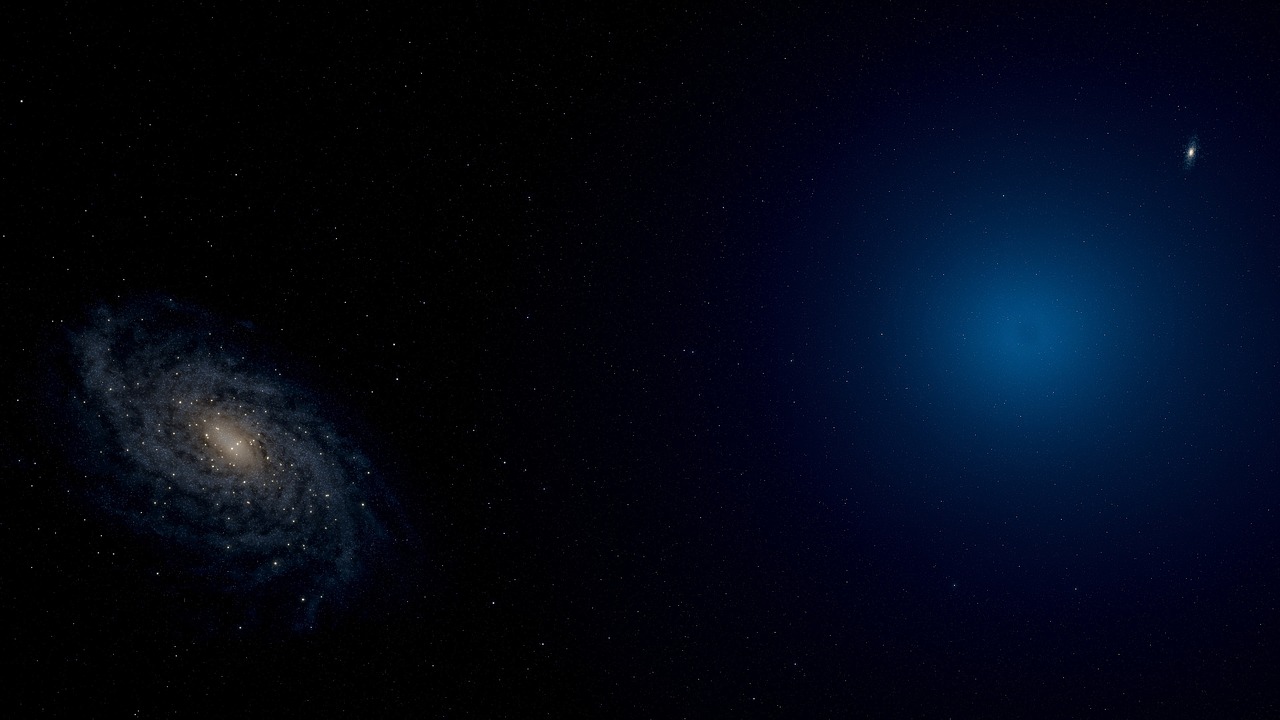
When we think about the cosmos, we inevitably stumble upon the concept of infinity. It’s a mind-boggling idea that can make our heads spin faster than a galaxy in motion. Imagine standing on the edge of a vast cliff, gazing into an endless ocean. Just as the horizon seems to stretch into oblivion, so too does our universe appear to extend infinitely in all directions. This notion is not just a mathematical curiosity; it has profound philosophical implications that challenge our very understanding of time, space, and existence itself.
Infinity can be a double-edged sword. On one side, it represents limitless possibilities, a canvas on which the universe paints its grand tapestry of stars, planets, and galaxies. On the other, it evokes a sense of insignificance, making us ponder our tiny place in this vast expanse. Have you ever looked up at the night sky and felt both awe and despair? That’s the paradox of infinity—it invites us to explore yet reminds us of our limitations.
Philosophers have long debated the implications of infinity. For instance, mathematical infinity plays a crucial role in cosmology. The idea that the universe may be infinite in size leads to questions about whether it has an edge or if it loops back on itself. This is where concepts like the multiverse emerge, suggesting that our universe might be just one of countless others, each with its own laws of physics and dimensions. Can you imagine the sheer number of realities that could exist? It’s mind-blowing!
Moreover, the concept of infinity in time raises even more questions. If the universe is infinite, does that mean it has existed forever? Or will it continue to exist indefinitely into the future? These questions challenge our understanding of causality and the origins of existence. Are we merely a fleeting moment in an eternal timeline, or do we hold a more significant role in the cosmic narrative?
To illustrate the philosophical implications of infinity, consider the following table that summarizes key perspectives:
| Philosophical Perspective | Implications |
|---|---|
| Mathematical Infinity | Challenges our understanding of size and quantity; leads to paradoxes. |
| Cosmological Infinity | Questions the nature of the universe's structure and boundaries. |
| Temporal Infinity | Explores the implications of an eternal past and future. |
In contemplating infinity, we also encounter the idea of eternity. How does one grasp the concept of something that has no beginning or end? It’s like trying to hold water in your hands—it slips away, leaving you with nothing but a wet reminder of your attempt. This struggle to comprehend infinity forces us to confront our own limitations as humans. We are bound by time, yet the universe seems to dance to a rhythm that transcends our understanding.
In summary, contemplating infinity is not just an intellectual exercise; it’s a journey into the depths of existence. It challenges us to rethink our place in the cosmos and confront the mysteries that lie beyond our grasp. As we continue to explore the universe, let’s embrace the questions that arise from infinity, for they may lead us to a greater understanding of ourselves and the cosmos we inhabit.
- What is infinity in the context of astronomy? Infinity refers to the concept of something that has no limits or bounds, which can apply to the size of the universe or the timeline of existence.
- How does infinity affect our understanding of the universe? It challenges our perceptions of reality, time, and space, leading to deeper philosophical questions about existence and our place in the cosmos.
- Are there different types of infinity? Yes, there are various types of infinity, including mathematical, cosmological, and temporal infinity, each with unique implications.
Frequently Asked Questions
- What is the relationship between philosophy and astronomy?
Philosophy and astronomy are intertwined, as philosophical questions often shape our understanding of the universe. Philosophers ponder the nature of reality, existence, and knowledge, which directly influences how we interpret astronomical discoveries.
- How do we acquire knowledge about the cosmos?
Knowledge about the cosmos is acquired through observation, experimentation, and theoretical frameworks. The scientific method plays a crucial role in this process, allowing us to formulate hypotheses and test them against empirical evidence.
- What is the significance of observational evidence in astronomy?
Observational evidence is vital in astronomy as it forms the foundation for our understanding of celestial phenomena. It helps validate theories and provides insights into the workings of the universe, influencing both scientific and philosophical discussions.
- Are there limits to human perception in astronomy?
Yes, human perception has its limits. Our senses can only detect a fraction of the universe's phenomena, which raises philosophical dilemmas about what we can truly know and how our understanding is shaped by our sensory capabilities.
- How have technological advancements impacted our understanding of the universe?
Technological advancements have revolutionized astronomy, allowing us to observe distant galaxies, planets, and other celestial objects that were previously beyond our reach. However, this reliance on technology also brings philosophical questions about the nature of our observations and the potential for misinterpretation.
- What are cosmological arguments, and why are they important?
Cosmological arguments are philosophical discussions that explore the existence of the universe and its origins. They provide insights into our place within the cosmos and challenge us to consider the fundamental nature of existence itself.
- How does infinity play a role in cosmology?
Infinity is a central theme in cosmology, influencing our understanding of time, space, and the universe's structure. Philosophically, it challenges our conventional notions of beginnings and ends, prompting deeper reflections on existence and the cosmos.

